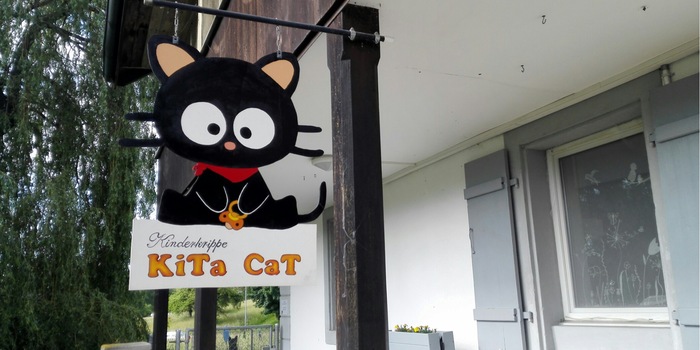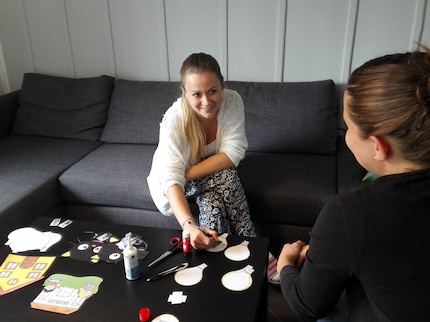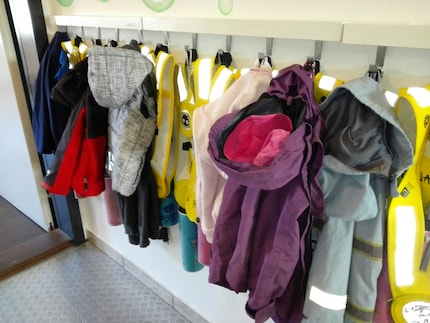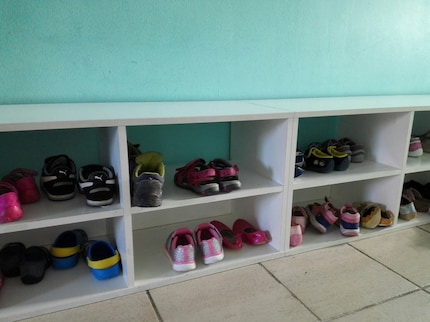
Background information
From tow truck mothers to zeppelin fathers: a guide to parenting types
by Katja Fischer

Many children are looked after by others every day. This requires mutual trust between the carer, child and parents. Sara Soliva, nursery teacher and daycare centre manager, tells me about the challenges she faces in daycare.
The image of the "woman" has changed in recent decades. She is rarely "just" a housewife as she used to be. She works for pay or on a voluntary basis. Parents are therefore increasingly outsourcing childcare. Either the grandparents look after the child or a childminder or a daycare centre (KiTa). Most people know what their own parents or parents-in-law do with their children. But what happens in a daycare centre often remains unspoken.
For this reason, I met Sara. She has been running the KiTa Cat crèche in Kölliken (AG) since 2011 and chatted to me about everyday life at the crèche. She is now a mum herself and one of those mothers who juggle a child and a career. Giving up work for her child was out of the question for her. Today, she brings her daughter to work with her. She is a mother, a carer for her own child and at the same time a carer for other children. Of course, this only works because the little one also joins in and she doesn't know any other way round the situation. When her tears are flowing or her knee is scraped, mum is still closer than with all the other children.

In addition to the rules, closeness and security are also important in a crèche. Children need this for their development. Sara agrees: "Closeness and distance are tricky topics and yet important. For many children, the daycare centre is their second home. That's where they play, learn, experiment, argue and also comfort each other. Some children need to be close to their teachers by sitting on our laps or clinging tightly to us. If we did not reciprocate the closeness of these children, they would feel abandoned. The children need warmth in their upbringing."
How to set boundaries and still allow closeness is a major challenge for the nursery teachers. Sara finds working with parents even more difficult. "There are always expectations that we can't fulfil," she says. Sara does not elaborate on what these expectations are. Out of protection for the carers. After all, the trust that parents place in her is very important in her job. Parents want to feel understood and be sure that their child is in good hands. Nevertheless, there are different types of parents, she says: "We have parents who aren't really interested in what the child experiences all day at nursery. Then there are those who want you to be involved in their private lives." For Sara, it is important that she maintains a good relationship with the parents, as this makes it easier to work with the children. "We try to fulfil the parents' and children's expectations and adhere to our own concept. It's a bit of a balancing act that we have to master every day," she adds with a smile.
In my opinion, patience is a virtue that a carer must have. But they also need to have a huge amount of nerves and energy. Children can be loud, argumentative, annoying, extremely slow, quick-tempered, but also tiring. But Sara takes her energy from the children themselves, from their successes and the experiences they have throughout the day. "You have to be born for this job," she says with a smile. "Sometimes I reach my limits. That's when a good team is important." In such situations, the nursery nurses briefly leave the room. They take a deep breath, gather themselves and return with renewed energy. I'm glad that the professionals feel the same way.

Watching children at play, it's easy to get into arguments. They often want the same toy that another child is already holding. For educators, arguments are also a balancing act. On the one hand, they are needed for the development of self-confidence and co. and on the other hand, they can quickly become violent: Pulling hair, pushing each other, snatching toys out of hands, hitting with fists or legs, biting the other person and so on. According to Sara, this usually happens in no time at all. "In such situations, we discuss the conflict with the children and tell the parents in the evening. We make sure that we don't use any names to protect the child," says Sara. They discuss their own attacks of violence as a team, hold daily rapports and also discuss public cases such as sexual assaults or psychological violence that are known. This enables her and the carers to act correctly in the right situation and contact the relevant authorities if necessary.
Illnesses are also discussed in the daily report. "It is clearly regulated that children with infectious diseases such as a gastrointestinal virus, hand-foot-and-mouth disease and chickenpox are not allowed to attend nursery". Nevertheless, it sometimes happens that a child first falls ill at the daycare centre. In such cases, parents must collect the child immediately. "This is to protect the sick child, the healthy children and our team," adds Sara. Coughs and runny noses are particularly common in the winter months. They are hardly noticed. Children with these symptoms are usually allowed to stay in the daycare centre.

There are various crèches that take photos of the children and then send them to the parents via WhatsApp. This is not the case at the KiTa Cat daycare centre. First and foremost, they protect the child and let the parents decide. Sara explains: "In the childcare contract, parents must specify whether and how we are allowed to photograph their child. We have a homepage with a login for parents and for Facebook. Parents can access a platform there to view the photos." The child cannot yet decide for themselves what impact a picture may have. This makes it all the more important for parents to protect the child. "The angle makes all the difference," adds Sara. And despite the parents' consent, they try to choose the angle of the photos so that the face is not or barely recognisable.
I’m the cook, cleaner, police officer, nurse, entertainer, motivator, author, storyteller, coach, organiser, chauffeur, lawyer and judge. To put it simply, I’m a mum to a daughter and not just a (Content) Manager at the office but also at home.
Interesting facts about products, behind-the-scenes looks at manufacturers and deep-dives on interesting people.
Show all